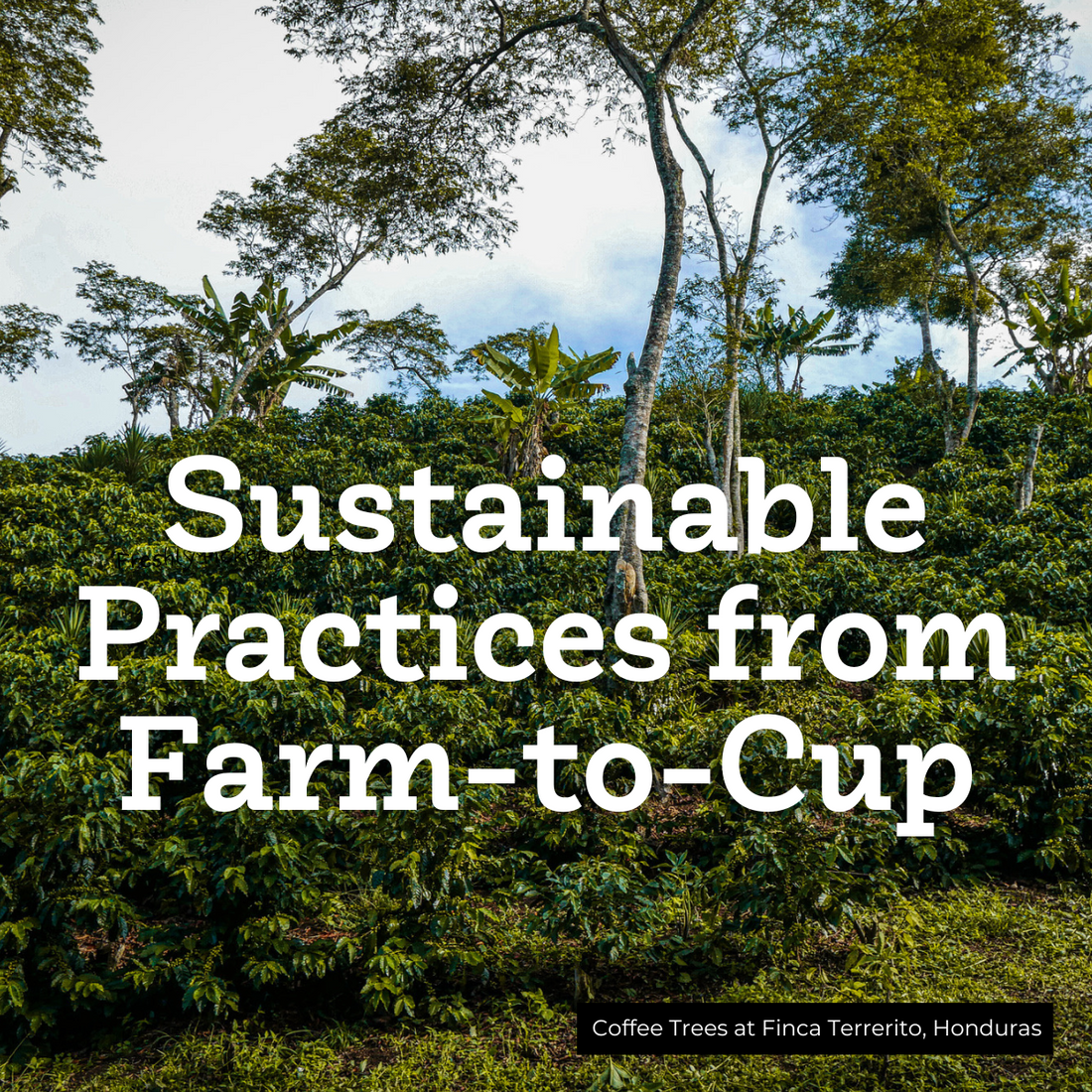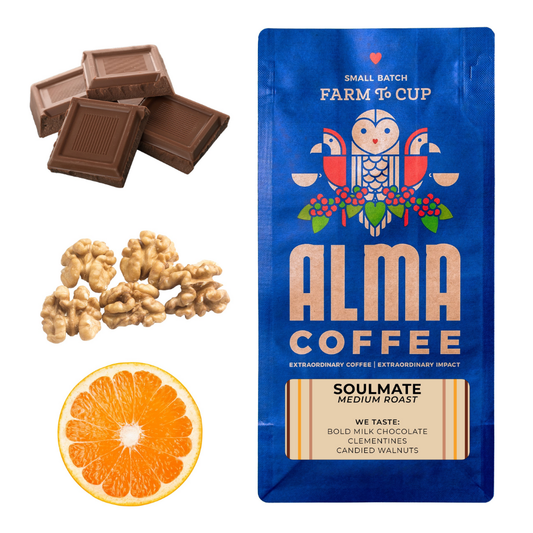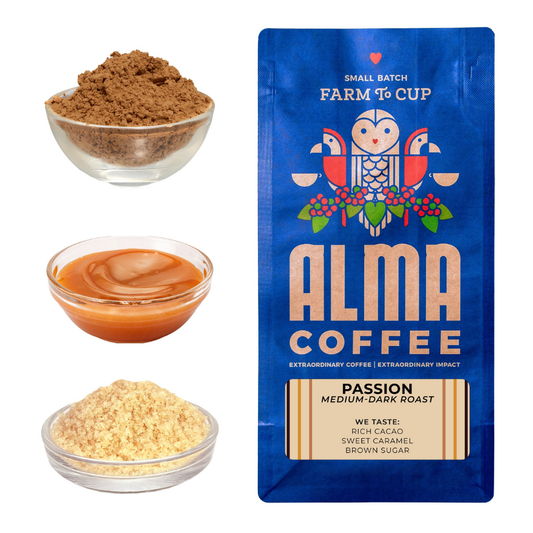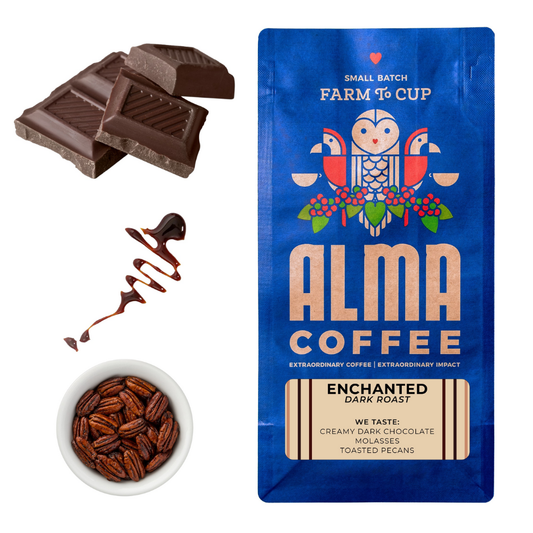
Sustainable Practices from Farm to Cup
Share
This Earth Day, we wanted to give you an insider’s perspective on how our family farm, Finca Terrerito, has helped Alma Coffee achieve a commitment to sustainable practices in everything we do and the improvement of lives through those very practices.
Our Alma-nac blog of the week will focus exclusively on the efforts made at Finca Terrerito over the last decade. Specifically, we want to highlight how a few notable sustainable practices and permaculture farming methodologies have minimized (and in most cases eliminated) Alma Coffee’s environmental impact at the farming level.
So, brew up your favorite cup of Alma Coffee and proudly take a sip of that delicious java knowing your purchase has impacted the world around you in a very positive way!
Permaculture Practices
Despite sounding like an 80s hair fad, “permaculture” is an approach to farming which derives from the combination of the words “permanent” and “agriculture” (Mollison & Holmgren, 1978).
In other words, permaculture focus on the biological ecosystems within nature that are capable of naturally regenerating and populating themselves, and permaculture farmers seek to work with this natural environment to harvest their crops as opposed to deforestation or industrial-scale farming.
As with many of the sustainable practices we’ll be covering in this blog post, there couldn’t be a more apt description for describing the efforts undertaken by our farmers at Finca Terrerito.
Shade Grown Coffee
Let’s start with one of the most exciting aspects of our family farm—the shade grown approach to growing coffee!
For the most part, large-scale coffee production requires large-scale space with consistent and specific climate conditions. For companies producing coffee on an industrial scale, it’s not uncommon to see deforestation or controlled burning within their farming practices to accomplish the necessary conditions for coffee production.
At Finca Terrerito, however, our coffee is grown within the cool, shaded spaces where pine tree forests dominate the landscape, and we have proven that this permaculture approach to coffee production can be accomplished over time at scale without disrupting the natural environment.
Coffee Husk Composting
We recently came across an article that suggested coffee pulp (the byproduct of coffee washing) can significantly boost the reforestation of natural environments at a rate that is 4 times faster and more effective than alternative approaches to forest recovery.
After speaking with Al Lopez, our co-founder and farm operator in Honduras, we learned that Finca T has been spreading coffee pulp and husks onto the Honduran forest floors for decades.
This approach to waste management, which isn’t necessarily a common practice across the entirety of the coffee farming industry, has resulted in a truly vibrant regrowth of natural ecosystems unlike any of Finca T’s neighboring farms.
This effort hasn't gone unnoticed either: Finca T was recently given the “Bird-Friendly” accreditation from The Smithsonian!
Chemical-Free Soil Management
Before we cover how Finca Terrerito commits to sustainability on the production side of things, it’s also important to note that our family farms have fully committed to sustainable soil management across the entire farm.
For example, instead of using chemicals to ward off pesky weeds, our farmers till and remove weeds from the soil by hand. This practice is tremendously labor intensive and, in the immediate moment, probably doesn’t seem like it does much to improve the world around us.
This commitment to avoiding chemical treatments over the years has added up: farmers at Finca T enjoy a richer more reliable natural soil bed as well as safer water sources in the surrounding area.
Sustainable Coffee Washing & Drying
We could seriously spend several blogs talking about Finca T’s commitment to more sustainable practices at the farming level; but, given that this blog is providing an overview of so many different things, we want to close the last half of this blog by focusing on our commitment to better production practices.
Wet-Washing Without Much Water
As we covered in last week’s blog, one of the most valid criticisms of the coffee industry at large is the amount of fresh water wasted in the coffee washing process, and this industry-wide problem was one of the first sustainability issues our farm sought to resolve.
For starters, Finca Terrerito decided early on that sourcing water from streams and/or local water supplies might contribute to the larger problem of excessive water usage, so we decided to source our own water directly.
In the middle of our family farms, a 400-foot water well provides our farmers with both fresh drinking water and an un-polluted source of H20 for washing the coffee cherries.
On top of this, our washed-process coffees reduce, re-use, and recycle water as much as possible throughout the production process. The water used to ferment our coffee cherries, for instance, is also used again to transport those cherries to drying beds using gravity-assisted technology our workers hand-built.
After this water takes the coffee seeds to the drying beds, it is processed through four different water treatment centers to take away any potential pollutants that could harm the local ecosystem before being dispersed into the vegetation across the farm.
Industrial-Scale Drying without Industrial-Scale Pollution
At the final stop of the coffee production process, it is extremely difficult to sustainably dry large volumes of wet-processed coffee without machinery that adds to the global pollution problem—but Finca Terrerito is very close to filling this sustainability gap!
As of the writing of the blog post, two industrial-sized coffee dryers, or “tumblers,” are being installed on our family farms. These two dryers will be fueled exclusively using leftover coffee parchment or ‘husk’ that can’t be composted back into the soil, an alternative approach to wood-burning generators common across the industry.
It is our hope that, with the addition of these industrial dryers and new water processing facility at Finca Terrerito, we can report back in April of 2022 with more on our family farm’s commitment to sustainable practices that continue to further Alma Coffee’s core mission of sustainability.
Until we report back in 2022, Happy Earth Day Alma Familia! Make sure you are stocked up on your favorite shade grown, permaculture and sustainably sourced coffee before leaving this week's blog post, and drop a comment below if you want us to dedicate a blog to diving deeper into our sustainable farming practices!
Written by: Kelley Bostian





